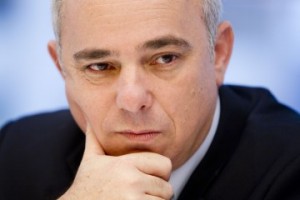 (Reuters) -�Israel�voiced concern on Tuesday over a potential meeting of the U.S. and Iranian presidents, saying Tehran's conciliatory overtures to world powers masked an acceleration of its disputed nuclear program.
(Reuters) -�Israel�voiced concern on Tuesday over a potential meeting of the U.S. and Iranian presidents, saying Tehran's conciliatory overtures to world powers masked an acceleration of its disputed nuclear program.An official Israeli assessment said�Iran�now had centrifuges for quickly turning low-enriched uranium into bomb fuel, putting it on a fast track to atomic arms even if it gave up uranium of mid-level purity which had previously been Israel's focus.
Iran's new government has gone on a charm offensive timed for the annual U.N. General Assembly, agreeing to international nuclear negotiations that would include its foreign minister seeing U.S. Secretary of State John Kerry.
U.S. officials also said a meeting was possible this week between President Barack Obama and Iranian counterpart Hassan Rouhani - a landmark after more than three decades of hostility.
Israel sees a mortal menace in an Iranian bomb it says could be six months from production and is wary of any let-up in Western pressure, backed by stringent sanctions, for a nuclear rollback by Tehran. Iran denies seeking atomic weapons.
Asked if there would be an Obama-Rouhani handshake, Yuval Steinitz, the cabinet minister now representing Israel at the U.N. forum in New York, said: "I hope not. I don't know."
"But really the important thing is not just words and appearances. The important thing is the actions. The important thing is the resolutions," Steinitz told Israel's Army Radio.
"And I really hope that the whole world, and chiefly among them the United States, will say, 'Okay, it's nice to hear the smiles, the new rhetoric, but as long as you don't change the conduct, and as long as you don't make a real concession in the nuclear project, the economic sanctions will continue and if there is need, will be joined by a military threat as well.'"
Iran has dismissed several U.N. Security Council resolutions aimed at curbing its nuclear work with bomb-making potential. It has tried to shift scrutiny to Israel's assumed atomic arsenal.
"WEEKS AWAY" FROM NUKES
At last year's U.N General Assembly, Prime Minister Benjamin Netanyahu set a "red line" beyond which Israel would attack Iranian nuclear sites. He drew that line across a cartoon-style bomb representing the scope of the Islamic Republic's enrichment of uranium to 20 percent purity, close to military grade.
An Israeli government estimate leaked to the Washington Post said Iran's new centrifuges were capable of turning stores of 3.5 percent pure uranium directly into bomb fuel "within weeks". Thus any "agreement to hand over all of its existing stockpile of highly (20 percent) enriched uranium would be insufficient".
The document, whose authenticity was confirmed by an Israeli official, presented such a handover as among "minor concessions" it said�Iran�hoped might lead to a deal with world powers and allow it to "build a nuclear weapon at a time of its choosing".
The last U.N. nuclear agency report, issued on August 28, showed Iran further expanding its uranium enrichment capacity by installing both new- and old-generation centrifuges. Independent experts say the new machines could refine uranium several times faster than the older versions, but that it is still unclear how well they will work and when Iran will switch them on.
Rouhani, who has adopted a much less confrontational approach than his predecessor, Mahmoud Ahmadinejad, said on Monday he would "present the true face of Iran as a cultured and peace-loving country" at the United Nations. He and Obama deliver their speeches to the General Assembly on Tuesday.
Washington says it remains determined to deny the Iranians the means to make nuclear arms but its willingness to engage them directly complicates strategy for Netanyahu, who will address the world forum on October 1.
The day before, Netanyahu is scheduled to meet Obama at the White House for discussions on Iran that Israeli officials say will affect the content and tone of his U.N. speech.
This time around, some Israeli officials predict, he will opt for a more sober, less rhetorical message. As well as flagging Iran's uranium enrichment, they say, he will note its potential second path to a bomb using plutonium.
"We are certainly warning the entire international community that Iran may want an agreement, but it is liable to be the Munich agreement," Steinitz said, referring to the 1938 appeasement of NaziGermany.
"Rouhani wants to hoodwink, and some in the world want to be hoodwinked, and the role of little Israel is to explain the truth and to stand in the breach. And that is what we are doing to the best of our abilities. It is a long struggle."
By Reuters
The Iran Project is not responsible for the content of quoted articles.










